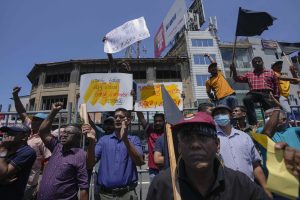The Sri Lankan economy has not been doing well for the last few decades. Consistent balance of payment issues due to dwindling exports and ballooning imports, low levels of foreign direct investment, and significant youth unemployment and underemployment have been features of the country’s economy.
Post-World War II history has shown us that land reform and labor-intensive manufacturing is the key to development. However, during its early years of independence, Sri Lanka overlooked these two crucial drivers of economic progress. In the agricultural sector, influential politicians obstructed land reforms, while bureaucrats hindered the expansion of extension services. Apart from President Ranasinghe Premadasa’s efforts to establish garment factories across Sri Lanka, the country did not earnestly pursue manufacturing growth that could generate employment opportunities, Uditha Devapriya, a well-known Sri Lankan columnist, told The Diplomat.
Along with these failures, Sri Lanka’s high living standards, due to decades of heavy investments in education and health in the first few decades following independence, started to decline.
Following the liberalization of the economy in 1977, Sri Lanka’s welfare-enhancing policies suffered neglect and harmful policies persisted. The expected boost to the economy from liberalization has not materialized, and inequality has increased over the years. This is no surprise as economists who had assessed the impact of market reforms worldwide cautioned that the productivity gains resulting from these reforms were temporary in nature. While market reforms successfully reallocated resources to more efficient sectors, the growth momentum eventually faded once the redirection process reached completion. There is no one magical solution to develop a country, and almost all nations that reached Western standards of development in the last 70 years had intelligent leaders babysitting the economy.
Sri Lankan policymakers and experts often present convenient policy solutions with the expectation of driving the country’s economy forward. Among these proposals, labor market reforms are frequently touted as a panacea. Sri Lanka has about 50 labor laws and the business community and international finance organizations have been asking successive governments to reform two laws in particular: the Industrial Dispute Act (No. 43, 1950) and the Termination of Employment of Workmen Act (No. 45, 1971). The latter places restrictions on private sector enterprises that employ 15 or more individuals with regard to firing permanent employees. In 2006, the World Bank said this law leads to “very high firing costs in Sri Lanka,” and insisted that these “rigid” labor laws are also a reason why Sri Lanka has such a large informal sector.
However, it is important to recognize that such reforms, which essentially aim to facilitate worker dismissals, when carried out in other developing countries have not effectively fulfilled their intended goal of fostering a robust economy with ample job opportunities. Often the enforcement of allegedly rigid labor laws is lax due to “ineffective inspection and prosecution.”
On the contrary there are reasons to believe that these reforms would undermine the bargaining power of labor and lead to downward pressure on wages, ultimately trapping the economy in a cycle of low wages and low productivity.
Despite business interests, politicians and international organizations have been pushing Sri Lankan governments to relax labor laws, which they found difficult to change due to union action. However, the recent economic crisis has allowed proponents of labor reforms to make fresh calls for change.
Sri Lanka sought International Monetary Fund (IMF) assistance in early 2022 as the country’s foreign reserves dwindled. As the economy reeled under a crisis, relaxing labor laws to attract FDI was touted as a solution to the country’s woes. Presenting the budget for 2023, President Ranil Wickremesinghe told Parliament that “labor laws have to be reformed for an export-oriented economy.” Sri Lanka will make reforms to change the economy going beyond the IMF recommendations, he said.
In May 2023, Minister of Labour Manusha Nanayakkara made a 11-point proposal to reform labor. Addressing the United National Party (UNP) May Day convention in Colombo, he said that the party is not “afraid to make unpopular decisions, similar to what the UNP did in the past for the greater good of the nation.” The UNP is Wickremesinghe’s party, and it was his uncle, former President J.R. Jayawardane, who liberalized the economy in 1977.
However, Nanayakkara’s 11 points are vague and there is no information on what the proposed laws would look like. The lack of transparency has led to serious concerns over the undermining of labor rights. The government has responded by asking the Inspector General of Police (IGP) to look into and initiate action “against those spreading false information on reforms about Sri Lanka’s labor laws.”
With little else to go by, Sri Lankan workers only have the track record of Sri Lankan politicians involved in the reform process and examples of IMF programs on collective labor rights to go by.
President Wickremesinghe has been involved in almost all economic liberalization initiatives since 1977, with precious little to show as achievements. Meanwhile, several studies have shown that IMF programs undermine labor rights. Even advanced economies have found it “difficult” to implement IMF advice on labor market policies.
It is not surprising that workers are worried.

































